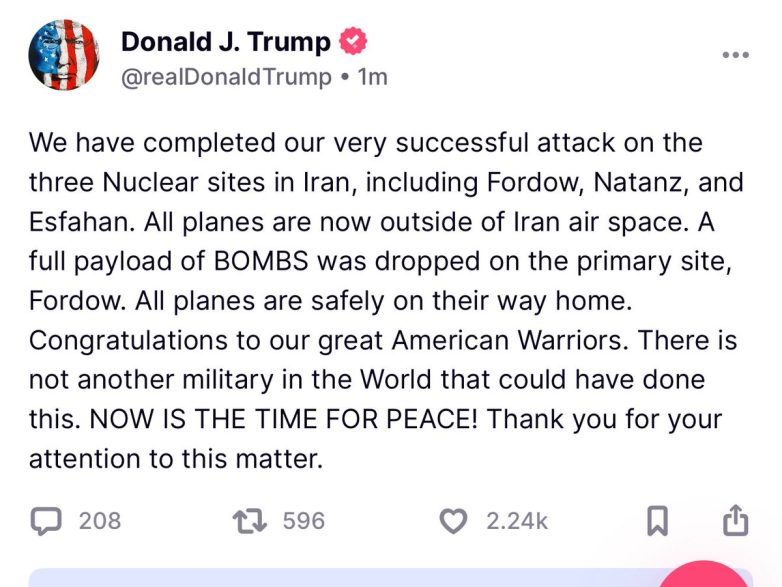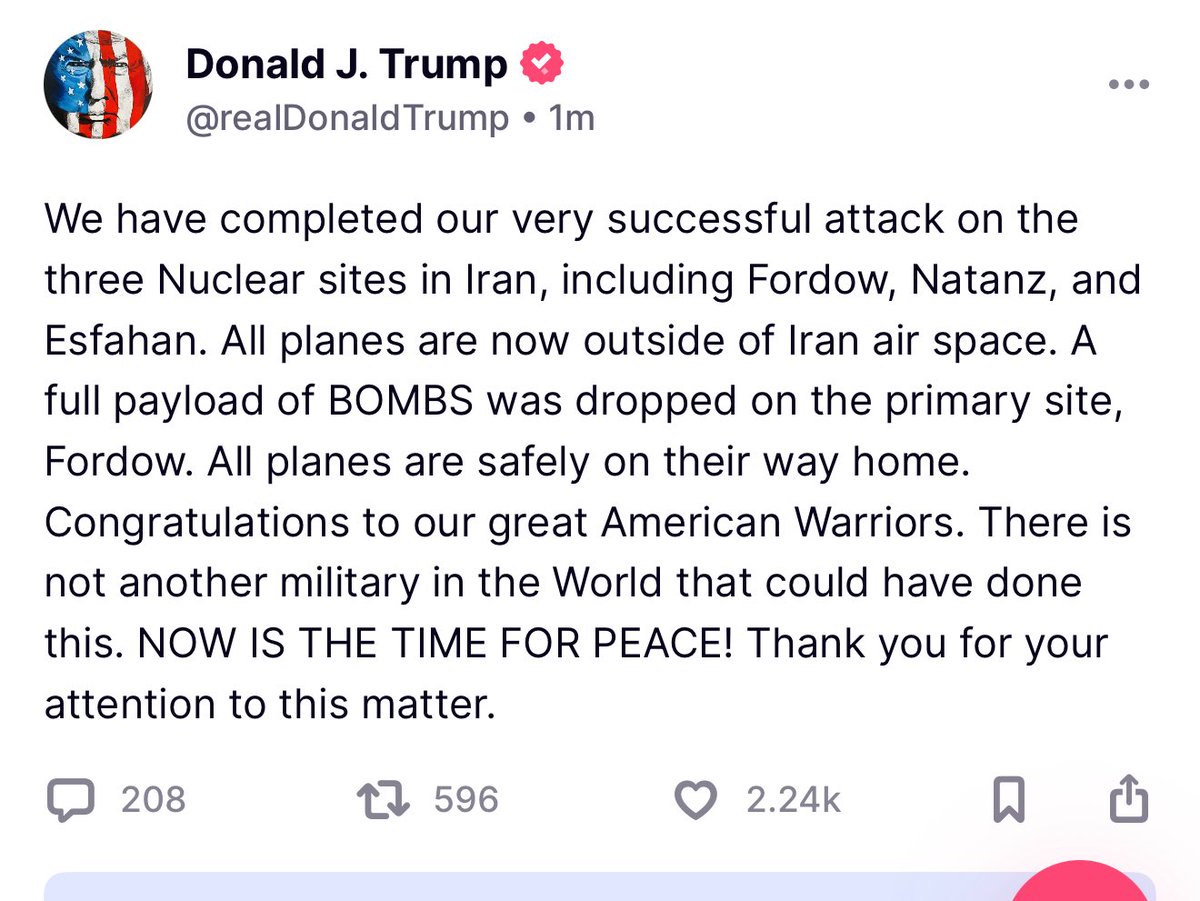
Trump’s Shocking Move: US Strikes Iran’s Nuclear Sites, What’s Next?
Iran nuclear conflict, US military action, Trump foreign policy
Breaking News: President Trump Confirms U.S. Bombing of Iran’s Nuclear Sites
In a shocking announcement that reverberated across the globe, President Donald Trump confirmed on June 21, 2025, that the United States has conducted airstrikes targeting all three of Iran’s nuclear facilities. This bold military action has stirred significant political and social reactions, with implications that could reshape international relations and security dynamics in the Middle East.
Details of the Operation
According to President Trump, the airstrikes were executed successfully, and U.S. military aircraft have already begun their return journey home. The President expressed gratitude for the support received during the operation, thanking American military personnel and allies involved in the mission. The precise details of the bombing, including the specific locations and the extent of the damage inflicted on the nuclear sites, have yet to be disclosed. However, the implications of this strike are profound, as Iran’s nuclear program has been a central point of contention between the U.S. and Iran for years.
Background Context
The escalation leading to this military action can be traced back to years of tension surrounding Iran’s nuclear ambitions. Various administrations, including Trump’s own, have grappled with how to effectively counter Iran’s nuclear development and perceived aggressions in the region. The Joint Comprehensive Plan of Action (JCPOA), commonly known as the Iran nuclear deal, was an attempt to limit Iran’s nuclear capabilities in exchange for sanctions relief. However, after the U.S. withdrew from the agreement in 2018, relations between the two nations soured further, leading to heightened hostilities.
Over the years, Iran has continued to advance its nuclear program, which has raised alarm among not only the United States but also its allies in the region, particularly Israel and Saudi Arabia. The threat of a nuclear-armed Iran has been a significant factor driving U.S. foreign policy in the Middle East, and the recent bombing marks a pivotal moment in this ongoing saga.
Reactions from Political Leaders and Experts
The announcement has elicited a wide array of reactions from political leaders, experts, and commentators. Supporters of the President’s decision argue that the airstrikes were a necessary measure to prevent Iran from developing nuclear weapons, thereby safeguarding regional and global security. They view the action as a definitive stance against Iranian aggression and a demonstration of U.S. military resolve.
Conversely, critics express concern over the potential escalation of conflict in the region. Many fear that this bombing could provoke retaliation from Iran, leading to a broader military confrontation that could involve other countries. Analysts warn of the potential humanitarian impact and the risks to civilian lives in the vicinity of the targeted sites.
International responses have also begun to emerge, with various nations calling for restraint and emphasizing the need for diplomatic solutions to the ongoing crisis. The United Nations and other international bodies are likely to convene discussions in the wake of this development, seeking to address the implications of the airstrikes on global stability.
The Future of U.S.-Iran Relations
As the dust settles from this unprecedented military action, the future of U.S.-Iran relations remains uncertain. The bombing has undoubtedly altered the strategic landscape, but it also raises critical questions about the path forward. Will the U.S. seek further military action, or will there be a renewed push for diplomacy? The potential for a new round of negotiations may hinge on how both countries choose to respond to this escalation.
Furthermore, the bombing could set a precedent for future U.S. military interventions under the guise of national security. The legal and ethical implications of such actions are already being scrutinized by legal experts and human rights advocates, who emphasize the importance of adhering to international law and protecting civilian lives.
Conclusion: A Pivotal Moment in Global Politics
President Trump’s announcement of the bombing of Iran’s nuclear sites marks a significant turning point in global politics. As the world watches closely, the outcomes of this military action will undoubtedly have lasting ramifications for U.S. foreign policy, regional security, and the delicate balance of power in the Middle East.
In the coming weeks and months, it will be crucial to monitor the responses from Iran and its allies, as well as any potential retaliatory measures that may arise. The international community will also be watching to see how the U.S. government navigates the aftermath of this high-stakes military engagement. The situation remains fluid, and as developments unfold, the focus will be on whether there is a possibility for a diplomatic resolution or if tensions will continue to escalate.
Stay tuned for more updates on this breaking news story, as the ramifications of President Trump’s announcement continue to unfold on the global stage.

BREAKING:
President Trump confirms the US just BOMBED all 3 Nuclear sites in Iran. He said all US planes are now on their way home.
Thank you, President Trump! pic.twitter.com/xYZ5Gz4HTN
— Laura Loomer (@LauraLoomer) June 21, 2025
BREAKING: President Trump Confirms the US Just BOMBED All 3 Nuclear Sites in Iran
In a stunning announcement, President Trump has confirmed that the United States has carried out airstrikes on all three nuclear sites in Iran. This news has sent shockwaves across the globe, and many are left wondering about the implications of such aggressive military action. What does this mean for international relations, for the people of Iran, and for global security? Let’s break it down.
Understanding the Context of the Airstrikes
The airstrikes come amid escalating tensions between the US and Iran, particularly concerning Iran’s nuclear program. The Iranian government has been advancing its nuclear capabilities, which has raised alarms not just in the US but among its allies in Europe and the Middle East. Many experts have long warned that Iran’s nuclear ambitions could lead to a destabilized region and a potential arms race.
Trump’s decision to bomb these sites reflects a significant shift in US foreign policy, moving away from diplomatic negotiations and towards a more interventionist approach. This is not the first time military action has been used as leverage in international politics, but it certainly raises the stakes.
The Immediate Reactions to the Bombing
Reactions have poured in from around the world. Supporters of Trump are praising the decision as a necessary step to protect American interests and deter Iranian aggression. On social media, figures like Laura Loomer expressed their gratitude to the president, emphasizing a sense of national pride and safety. However, critics are voicing their concerns about the potential for retaliation and further conflict.
Many humanitarian organizations and advocates are worried about the impact on civilians. Airstrikes can lead to significant collateral damage, and the humanitarian implications of such actions can be dire. The people of Iran, who are already facing economic hardships due to sanctions, may bear the brunt of this decision.
The Strategic Implications of Targeting Nuclear Sites
Targeting Iran’s nuclear sites is a bold move, aimed at crippling their nuclear ambitions. But what does this actually achieve? By destroying these facilities, the US hopes to delay Iran’s ability to develop nuclear weapons. It sends a clear message that the US will not tolerate nuclear proliferation in a region already fraught with tension.
However, this approach is not without its risks. Military action could provoke Iran into retaliating against US interests or allies in the region, potentially leading to a larger conflict. This could also galvanize support for hardline factions within Iran, making diplomatic resolutions even more difficult.
Public Opinion on Military Action
Public opinion on military intervention is often divided. While many Americans support strong action against perceived threats, there is also a significant portion of the population that is wary of military entanglements. The long history of US involvement in the Middle East has led to skepticism about the effectiveness of military solutions.
Polls often show mixed feelings about airstrikes, with many citizens concerned about the potential for loss of life and the long-term consequences of such actions. The question remains: can military action ever truly achieve lasting peace, or does it merely create more problems down the line?
The Role of Diplomacy in US-Iran Relations
Even as military action unfolds, the role of diplomacy cannot be overlooked. The US has a long and complicated history with Iran, marked by periods of intense conflict and brief moments of negotiation. The Joint Comprehensive Plan of Action (JCPOA), commonly known as the Iran nuclear deal, was a significant diplomatic effort aimed at curbing Iran’s nuclear capabilities in exchange for relief from sanctions.
With the bombing of nuclear sites, the chances for diplomatic engagement may diminish. Critics argue that military action undermines the possibility of meaningful dialogue. If the goal is truly to ensure peace and security, then finding a way to negotiate with Iran may be more effective in the long run.
Potential Consequences of the Bombing
What happens next? The consequences of this bombing could be far-reaching. On one hand, if the strikes successfully disable Iran’s nuclear program, it may be seen as a victory for the US. However, the potential for retaliation looms large. Iran has vowed to respond to any acts of aggression, and the situation could escalate quickly.
Additionally, the bombing may affect US relations with other nations. Allies in Europe may express concern over the unilateral military action, while adversaries like Russia and China may see this as an opportunity to strengthen ties with Iran. The geopolitical landscape is intricate, and any military action can have ripple effects that are hard to predict.
Public Safety and Military Transparency
Amidst all this chaos, the safety of citizens both in the US and Iran is paramount. Transparency about military actions is crucial for maintaining public trust. The government must communicate clearly about the reasons for such strikes and the expected outcomes. This includes being honest about the risks involved and the potential for civilian casualties.
Moreover, the media plays a vital role in informing the public about the realities of military engagement. Coverage should not only focus on the political implications but also highlight the human stories behind the headlines. Understanding the consequences for ordinary people can foster empathy and encourage more thoughtful discussions about military action.
Looking Ahead: The Future of US-Iran Relations
As we move forward, the future of US-Iran relations hangs in the balance. The bombing of nuclear sites is a significant escalation, and it may lead to a new phase in this longstanding conflict. The international community will be watching closely to see how both the US and Iran respond in the coming days and weeks.
Will this military action lead to a renewed commitment to diplomacy, or will it entrench both sides in a cycle of retaliation and conflict? Only time will tell. What is clear is that the stakes are high, and the implications of these actions will be felt for years to come.
Conclusion: A Call for Reflection
As we process this breaking news, it’s essential to reflect on the broader implications of military intervention. While the immediate threat posed by Iran’s nuclear ambitions is real, we must also consider the long-term consequences of our actions. Dialogue, diplomacy, and a commitment to understanding can often pave the way for peace more effectively than airstrikes.
The future remains uncertain, but one thing is clear: the world is watching, and the decisions made today will shape the landscape of tomorrow.
BREAKING: President Trump confirms the US just BOMBED all 3 Nuclear sites in Iran. He said all US planes are now on their way home. Thank you, President Trump!